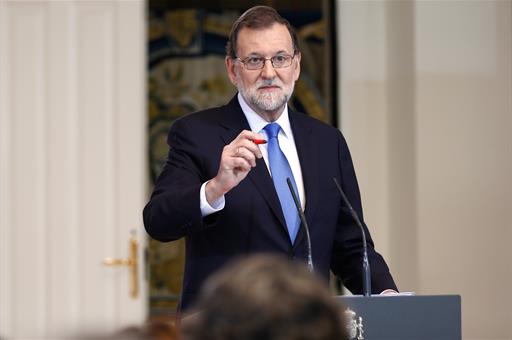Moncloa Palace, Madrid
The President of the Government reported that the Council of Ministers authorised an appeal against the unconstitutional nature of the reform of the Regulation of the Regional Government of Catalonia to be lodged, which "would allow the laws through which they seek to liquidate national sovereignty, the Spanish Constitution and the very Statute of Autonomy through the fast-track route and without the most basic democratic guarantees to be approved".
Mariano Rajoy recalled that in a report, the Council of State indicates that the new regulation may be in breach of the law on the political participation of parliamentary minorities in conditions of equality, as guaranteed by our political system. By lodging this appeal, underlined the President of the Government, "the government meets its obligation to uphold the law" and "defends regional Catalan institutions and their public servants".
The President of the Government also remarked that the Catalan Employers' Association - Fomento de Trabajo - has called for the Regional Government of Catalonia to renounce its breakaway plans. "This is a noble, honourable and brave message that should be heeded", added Mariano Rajoy, who considers that Catalan society "needs to be protected from a radical and divisive project that they are trying to force through".
Mariano Rajoy reiterated that "a referendum will not be held on 1 October because the Constitutional Court has clearly ruled that this is unconstitutional" and because it goes against "the very institutional architecture that has given Catalonia the highest level of self-governance ever". However, he asserted that he remains determined to "defend the law calmly and with the moderation provided to him by the instruments of the rule of law", as well as his interest in speaking with the Catalan institutions to the benefit of all citizens.
Improved forecasts
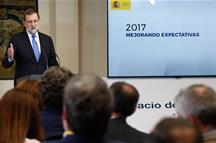 Pool Moncloa/CPSFor the President of the Government, the fact that best sums up the first half of the year is the constant upgrade of the forecasts. "Spain is growing and improving day-by-day in the eyes of the whole world, as well as in the eyes of the people of Spain".
Pool Moncloa/CPSFor the President of the Government, the fact that best sums up the first half of the year is the constant upgrade of the forecasts. "Spain is growing and improving day-by-day in the eyes of the whole world, as well as in the eyes of the people of Spain".
This improvement is not limited, he argued, to economics, but also to the political climate in Spain and in Europe as a whole, and also to the institutional image of the country. "We have problems, some of which are serious, but we are in a position to tackle them with a very much stronger and recovered country", he stated.
Economic balance
Mariano Rajoy based this diagnosis, in the first place, on the economic situation: Spain is enjoying its fourth year of growth and the third in which it is growing by at least 3%, above the average of the Eurozone and also of such countries as Canada, Japan and the United States.
Furthermore, after seeing the figures for the second quarter of the year, he highlighted that "we can now state that we have recovered the level of wealth we enjoyed before the crisis", one of the main goals of the government for 2017.
Intense job creation
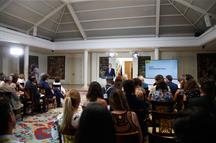 Pool Moncloa/CPSThe most important aspect, according to the President of the Government, is that this growth is translating into jobs: the reduction in unemployment reflected in the Labour Force Survey for the second quarter is the largest reduction ever seen. Furthermore, during this period, more than 4,000 jobs have been created each day. "The goal we had set for this term of office of 20 million Spaniards in work, may even be achieved before the year 2020", he announced.
Pool Moncloa/CPSThe most important aspect, according to the President of the Government, is that this growth is translating into jobs: the reduction in unemployment reflected in the Labour Force Survey for the second quarter is the largest reduction ever seen. Furthermore, during this period, more than 4,000 jobs have been created each day. "The goal we had set for this term of office of 20 million Spaniards in work, may even be achieved before the year 2020", he announced.
The President of the Government expressly referred to the fall in youth unemployment to below 40% - something not seen since the year 2009 - and to the reduction in the long-term unemployed and to the number of homes with all members out of work.
Spain is now more competitive
The dynamic nature of the foreign trade sector, based on more competitive exports, is the third main element that certifies "the health of our economic recovery", according to the explanation given by the President of the Government when taking stock of the situation. For the first time in its history, Spain has enjoyed five years with a positive foreign trade balance, and in 2017 exports continue to break records. "Spain is the country from among the major developed economies, with the exception of Germany, that most exports", he pointed out.
Other positive data quoted by Mariano Rajoy include the fall in the risk premium to below 100 basis points, the rise in confidence of economic and social agents, growth in private consumption and investment in machinery and equipment, dinamysm of the industrial sector and services, the recovery of construction - permits for new builds grew at a rate of 20% in April - and the number of inbound tourist and the amount they spend.
"This all goes to show that Spain is now a more competitive economy and that it is growing and creating jobs at a higher level than the forecasts, because it is producing, exporting and consuming without incurring foreign debt", he stressed.
Budget stability
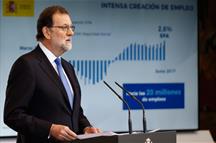 Pool Moncloa/CPSThe President of the Government maintained that these figures show that Spanish society has found a way to "turn round a dramatic situation in a very short time" and establish "a framework of trust" for citizens and foreign investors.
Pool Moncloa/CPSThe President of the Government maintained that these figures show that Spanish society has found a way to "turn round a dramatic situation in a very short time" and establish "a framework of trust" for citizens and foreign investors.
In order to continue this trend, Mariano Rajoy advocated maintaining the cornerstone of economic policy adopted in recent years: a commitment to fiscal consolidation and structural reform. "And this must furthermore be done within the current institutional framework that requires agreements to be reached with other political forces", he remarked.
The President of the Government claimed that the strategy implemented by the government in the first part of the year, "together with other political forces that have displayed loyal collaboration", and the approval of the Budget for 2017, "mean that the deficit target of 3.1% is within reach". He also pointed out that the government expects to push through the Budget for 2018 through dialogue with other groups "because they are key for Spain exiting the excessive deficit procedure and to ensuring the path towards recovering all the jobs lost during the crisis".
Political balance
The President of the Government highlighted the government's ability to not only push through the budget but also other government initiatives, reach agreements and defeat "the motion of no confidence with absolute calm".
Mariano Rajoy quoted the extraordinary investment plan in highways for the sum of 5 billion euros, which will be carried out through public-private collaboration, the two renewable energy auctions held, the drafting of the Statute on Victims of Crime and the School Environment Plan.
 Pool Moncloa/CPSHe also highlighted the agreements reached with the opposition on such issues as Youth Guarantee, the reform of the stevedore sector, the private copying levy, the law on the self-employed, the electricity discount and the minimum wage. He made particular reference to the parliamentary agreement for a State pact on gender-based violence.
Pool Moncloa/CPSHe also highlighted the agreements reached with the opposition on such issues as Youth Guarantee, the reform of the stevedore sector, the private copying levy, the law on the self-employed, the electricity discount and the minimum wage. He made particular reference to the parliamentary agreement for a State pact on gender-based violence.
The President of the Government acknowledged the collaborative attitude of those political groups that have backed these pacts which, in his opinion, clearly shows that "the ability to enter into dialogue and agreement has stamped its mark on a complex stalemate situation that could have existed" in Parliament.
Regional dialogue
The government's commitment to dialogue has also extended to regional jurisdictions. In this regard, Mariano Rajoy pointed out that a good number of the agreements reached at the Conference of Regional Presidents on 17 January have now been set motion.
The President of the Government announced that the group of experts that is studying the reform of the regional financing system has presented its proposals this week. The study group on the sustainability of the long-term care system, the National Civil Protection Council and the study group on the social discount card have also all been set up.
The President of the Government added that "the agreements on employment, both on active employment policies and on public employment, are being followed with quantifiable results and with the commitment to rethink the efforts in order to speed up the results".
International balance
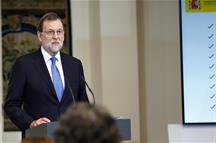 Pool Moncloa/CPSAccording to Mariano Rajoy, at a European level, "things have noticeably improved" in recent months, "populism has clearly waned in the most recent general elections and the victory by [Emmanuel] Macron in France has given a renewed boost to the European project".
Pool Moncloa/CPSAccording to Mariano Rajoy, at a European level, "things have noticeably improved" in recent months, "populism has clearly waned in the most recent general elections and the victory by [Emmanuel] Macron in France has given a renewed boost to the European project".
On another note, he said that "Europe is showing signs of cohesion and responsibility by remaining united without schisms in the negotiations with the United Kingdom on Brexit". On this matter, the President of the Government highlighted that "Spain is satisfied at the way in which its priorities have been imposed in the negotiations".
Defence, the fight against Jihadi terrorism, the management of immigration flows and greater economic integration and social cohesion must be the cornerstones on which the future of the EU is based, he remarked.
Mariano Rajoy also highlighted Spain's participation at the European Council meetings in March, April and June; at the informal summits in Malta and Rome; at the summits of Southern European countries, one of which was held in Madrid; at the Versailles Summit, which will once again be held on 28 August in France, at the G-20 debates as well as at the high-level bilateral meetings held with the Governments of France, Portugal and Poland.
Democratic and peaceful solution for Venezuela
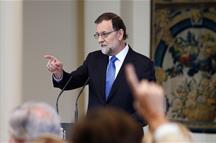 Pool Moncloa/CPSMariano Rajoy declared the government's "profound concern" over the situation in Venezuela, which has reached "a critical point" after three months of protests and "violent repression", and over the call by the Venezuelan Government to hold elections to form a constituent assembly "that is rejected by most of the population".
Pool Moncloa/CPSMariano Rajoy declared the government's "profound concern" over the situation in Venezuela, which has reached "a critical point" after three months of protests and "violent repression", and over the call by the Venezuelan Government to hold elections to form a constituent assembly "that is rejected by most of the population".
The Government of Spain, he explained, "in the same way as all of the Member States of the EU, the countries in the region and many international and regional organisations, calls for the Government of Venezuela to reconsider the situation". Mariano Rajoy called for a "democratic, peaceful and negotiated" solution to the crisis, which requires an end to violence, respect for the right to peaceful demonstration and the separation of powers, "the full release of the more than 400 political prisoners in Venezuela", urgent humanitarian measures and the holding of "free, democratic and transparent" elections.
Spain, he added, has headed up a "firm" response from the EU, and, together with its European partners, will closely follow the development of the situation, "without ruling out the adoption of additional measures if this could prove to be effective".
The President of the Government concluded his summary by expressing his satisfaction at the achievements made, which have allowed Spain to rise to number 13 in the international reputation ranking, its highest position on record.
Train accident in Barcelona
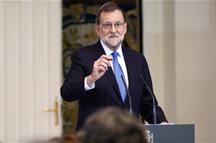 Pool Moncloa/CPSThe President of the Government began his speech by wishing those injured in the train accident in Rodalies [local commuter trains] that took place on Friday morning in Barcelona a "speedy recovery".
Pool Moncloa/CPSThe President of the Government began his speech by wishing those injured in the train accident in Rodalies [local commuter trains] that took place on Friday morning in Barcelona a "speedy recovery".
Mariano Rajoy explained that, in a talk he held with the President of the Regional Government of Catalonia, Carles Puigdemont, he has offered the government's assistance and that, furthermore, the Minister for Public Works, Íñigo de la Serna, is in Barcelona at this time.
Collaboration with the regional Catalan authorities "will be full and loyal, with the goal of recovering normality as quickly as possible".





